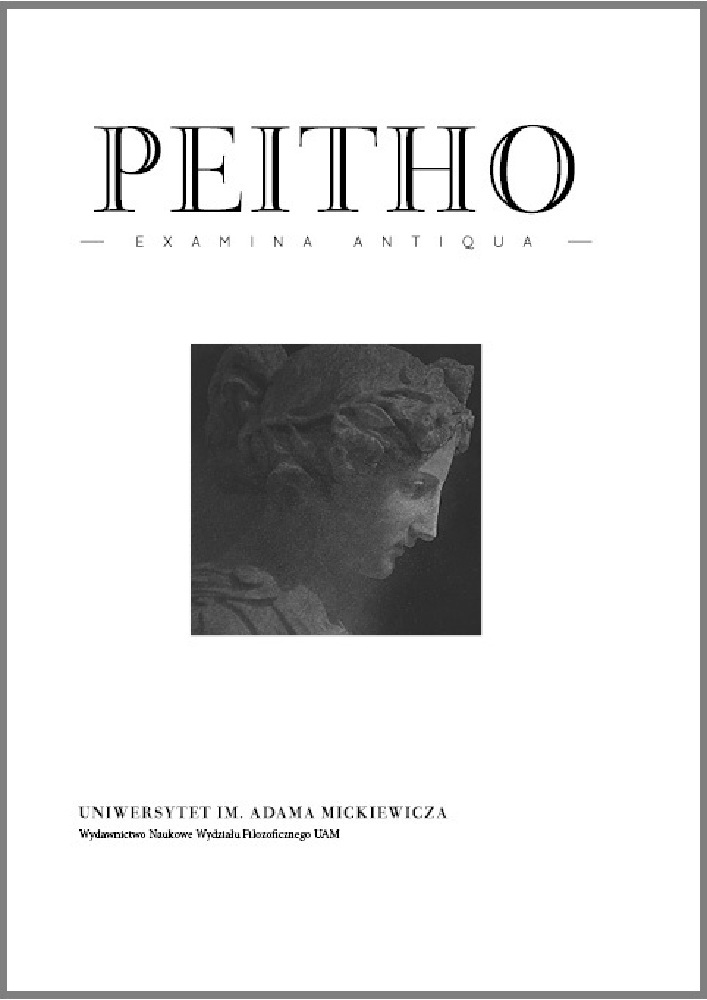Abstract
In EE H 2 Aristotle presents a typology of friendship starting from the puzzle whether the good or the pleasure is the object of love. But after indicating the reasons for loving and identifying three types of friendships he raises three important questions (1237a19–21): (1) whether there is any friendship without pleasure; (2) how the hedonical friendship differs from the ethically friendship; (3) on which of the two things the loving depends: do we love somebody because he is good, even if he is not pleasant, at any rate not for his pleasantness? The present article attempts to give answers to questions 1–3 and show that despite the coincidence of good and pleasure and the important role of pleasure in the hedonical and ethical friendship the typology does not lose its validity.
References
Aristote, 1959, L’ Éthique à Nicomaque, t. II: Commentaire, R.A. Gauthier, J.Y. Jolif, Louvain.
Aristotele, 2012, Etica Eudemea, M. Zanatta (cur.), Milano.
Aristoteles, 1960, Aristotelis Opera, I. Bekkeri (rec.), O. Gigon (cur.), Berolini.
Aristoteles, 1962, Eudemische Ethik, F. Dirlmeier (übers.), Berlin.
Aristotle, 1954, Ethica Eudemia, J. Solomon (transl.), London.
Aristotle, 1962, The Eudemian Ethics, H. Rackham (transl.), London.
Aristotle, 2011, The Eudemian Ethics, A. Kenny (transl.), Oxford.
Aristotle, 1998, Nicomachean Ethics, Books VIII and IX, M. Pakaluk (transl. & comm.), Oxford.
Aristotle, 2002, Nicomachean Ethics, Ch. Rowe (transl.), S. Broadie (intr. & comm.), New York.
Arystoteles, 1977, Etyka eudemejska, W. Wróblewski (tłum.), Warszawa.
Bostock, D., 2000, Aristotle’s Ethics, Oxford–New York.
Broadie, S., 1991, Ethics with Aristotle, Oxford–New York.
Cooper, J.M.C., 1977, „Aristotle on the Forms of Friendship”, Review of Metaphysics 30, s. 619–648.
Galewicz, W., 2002, Z Arystotelesem przez greckie tragedie, cz. 1, Glosy i ilustracje do „Etyki nikomachejskiej”, Kraków.
Homer, 1984, Iliada, I. Wieniewski (tłum.), Kraków.
Kant, I., 1953, Uzasadnienie metafizyki moralności, M. Wartenberg (tłum.), Warszawa.
Kenny, A., 1978, The Aristotelian Ethics, Oxford.
Owens, J., 1989, „An Ambiguity in Aristotle, EE VII 2, 1236a23–4”, Apeiron 22, s. 127–137.
Pakaluk, M., 2005, Aristotle’s Nicomachean Ethics, Cambridge.
Price, A.W., 1989, Love and Friendship in Plato and Aristotle, Oxford.
Smolak, M., 2010, „Energeia i kinēsis a haplōs energeia i energeia atelēs w świetle rozważań Arystotelesa”, Kwartalnik Filozoficzny 38, s. 123–144.
Smolak, M., 2013, Przyjaźń w świetle etyki Arystotelesa, Kraków.
Smolak, M., „Pierwszy paragraf siódmej księgi Etyki eudemjeskiej (7.1, 1234b18–1235b12) — wprowadzenie, przekład i komentarz”, Analiza i Egzystencja, 31, s. 37–63 (w druku).
Whiting, J., 1996 „Self-love and Authoritative Virtue”, w: S. Engstrom, J. Whiting (eds.), Aristotle, Kant, and the Stoics. Rethinking Happiness and Duty, Cambridge, s. 162–199.
License
Peitho provides immediate open access to its content on the principle that making research freely available to the public supports a greater global exchange of knowledge.
